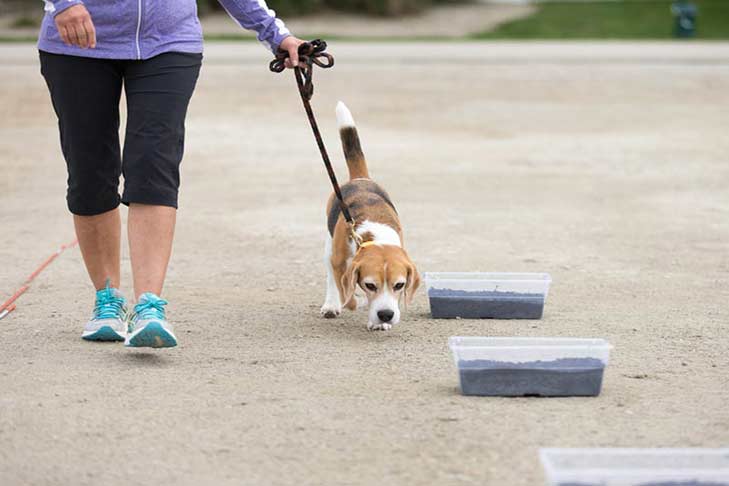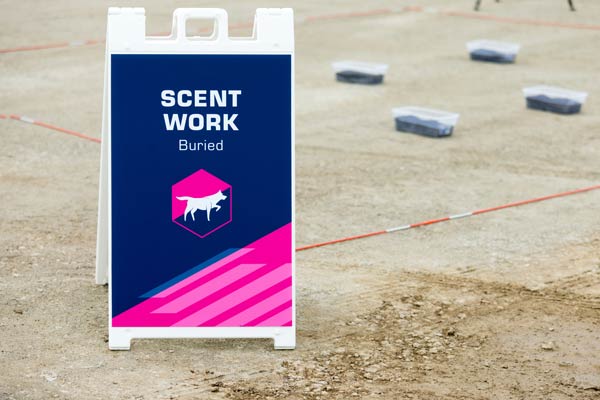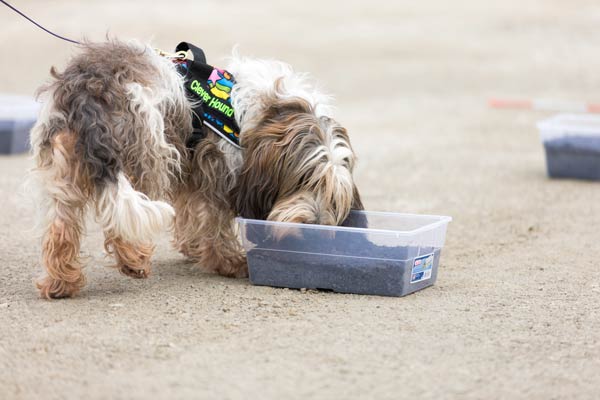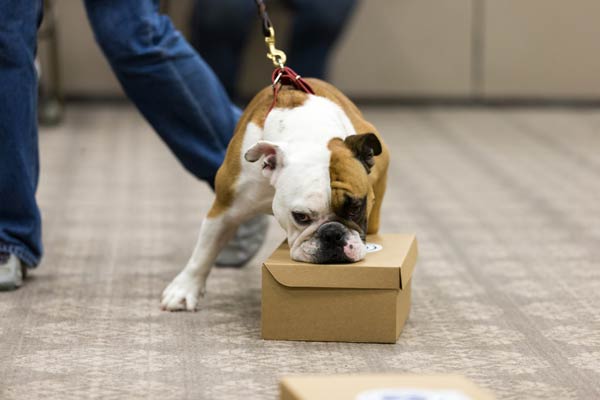
On October 1, the AKC rolled out Scent Work, a new titling event open to all dogs. Before the AKC introduces a new sport, staff methodically evaluates, adapts, and develops the event. The process can take several months, sometimes years.
Stephanie Kennerley is Sports and Events Projects coordinator. Her department creates and implements new AKC sports programs. Days before AKC Scent Work went live with AKC dog clubs, AKC Family Dog’s Bud Boccone sat down with Stephanie to learn how dogs can title by indulging their primal desire to sniff.
Stephanie, let’s start with a “scent work for dummies” primer.
Scent Work is based on the skills of working detection dogs—narcotics, explosives-detection, recovery, and rescue—any dogs used by the police and military to find a specific scent. There are different classes in Scent Work, and they mimic different types of detection.
Container class, where a dog has to pinpoint which one or more containers has the target odor, mimics the type of work done by TSA dogs you might see around the airport. In the Interior class dogs search indoor areas, like narcotics-detection dogs do. Exterior classes mimic searches dogs might do outdoors—explosives detection is my go-to example of that.
The Buried class mimics human-remains detection dogs finding scent buried in the ground. Lastly, we have classes that focus on handler scent. Real-world situations that involve finding human scent include tracking and search-and-rescue work.

I’m assuming, no actual drugs or explosives.
Of course, nothing dangerous. The dogs are scenting for essential oils—birch, anise, clove, and cypress—the kind you can buy in any store geared to natural products. We have a Scent Work kit you can buy at leerburg.com; it’s the kit we use in actual classes. Some manufacturers put additives in their oils, so the scent isn’t quite as pure. But for starting out at home, you can just go to Whole Foods and buy yourself some birch oil.
How much oil is used?
Two drops on a Q-Tip. And depending on the level, dogs search for one or more of the scents. In Novice, you train for birch—it’s always going to be birch. At Advanced, it could be birch or anise; at Excellent, it could be birch, anise, or clove. And at the Master level, it could be any of the four scents.
What happens when the clock starts ticking?
In Container, the judge calls you into the area with all the containers. You have no idea where the “hide” is, neither does your dog. But the judge knows. The dog sniffs the boxes and when he indicates, you have to tell the judge, “Alert.” To succeed, dog and handler must find and call all of the hides within a time limit, without committing any faults.

Breeds known for a great nose—beagles, say—would seem to have the edge.
In the end, it’s a team sport. A dog might have the best nose in the world and the team won’t succeed unless the handler knows how to read the dog, to see when the dog has detected the odor but hasn’t yet worked it all the way back to source.
All kinds of dogs succeed at Scent Work. You do see typical police types—Dobermans, the Belgians, German Shepherd Dogs, but also Mastiffs, Papillons, and Whippets. Even a blind or three-legged dog can do it.
At the master level, what’s the handler doing to optimize performance?
First, you will evaluate the area. You’ll notice where the air flow is going and what it might be doing to the odor. You’ll have a search pattern in your head, for maybe where you want to direct your dog if they’re struggling. This is the kind of thinking going on at the high levels. But basically, handling is: Keep your eye on your dog, and trust your dog.

Where are people doing this?
It’s fun because you can do Scent Work anywhere. It mimics the work of real-life detection dogs, who do their searches pretty much anywhere. So, we have a club planning an event at a mini-golf course, another at a church. There’s one taking place at a police department. And the classes can be tailored to the areas available. A club can offer any combination of classes they want.
This sounds like a golden opportunity to cross “win AKC title at mini-golf course” off my bucket list. How do I find scent work in my area?
Search akc.org for a club offering Scent Work events and see if they hold training classes. If they don’t, the club will probably have a good idea of what training resources there are in your area.
Tip: To get started, pick up an AKC Scent Work Kit here.
Originally published in AKC Family Dog.
 This article originally appeared in the award-winning AKC Family Dog magazine. Subscribe today!
This article originally appeared in the award-winning AKC Family Dog magazine. Subscribe today!

